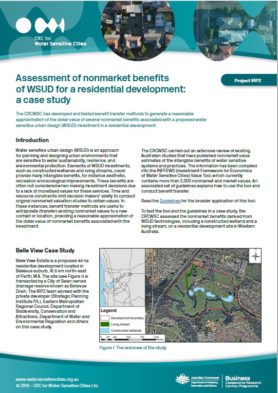Assessment of non-market benefits of WSUD for a residential development: a case study
Introduction
Water sensitive urban design (WSUD) is an approach for planning and designing urban environments that are sensitive to water sustainability, resilience, and environmental protection. Elements of WSUD investments, such as constructed wetlands and living streams, could provide many intangible benefits, for instance aesthetic, recreation and ecological improvements. These benefits are often not considered when making investment decisions due to a lack of monetised values for these services. Time and resource constraints limit decision makers’ ability to conduct original nonmarket valuation studies to obtain values. In these instances, benefit transfer methods are useful to extrapolate (transfer) existing nonmarket values to a new context or location, providing a reasonable approximation of the dollar value of nonmarket benefits associated with the investment.
The CRCWSC carried out an extensive review of existing Australian studies that have published nonmarket value estimates of the intangible benefits of water sensitive systems and practices. The information has been compiled into the INFFEWS (Investment Framework for Economics of Water Sensitive Cities) Value Tool, which currently contains more than 2,000 nonmarket and market values. An associated set of guidelines explains how to use the tool and conduct benefit transfer.
